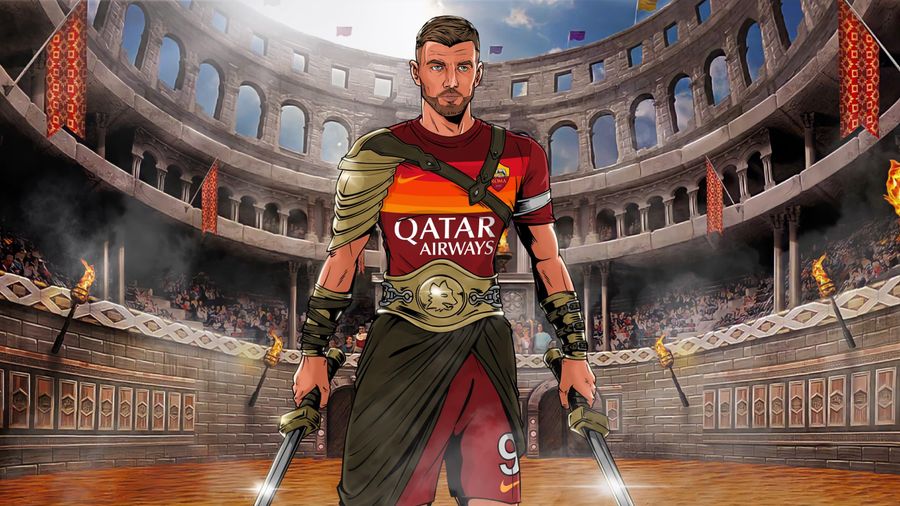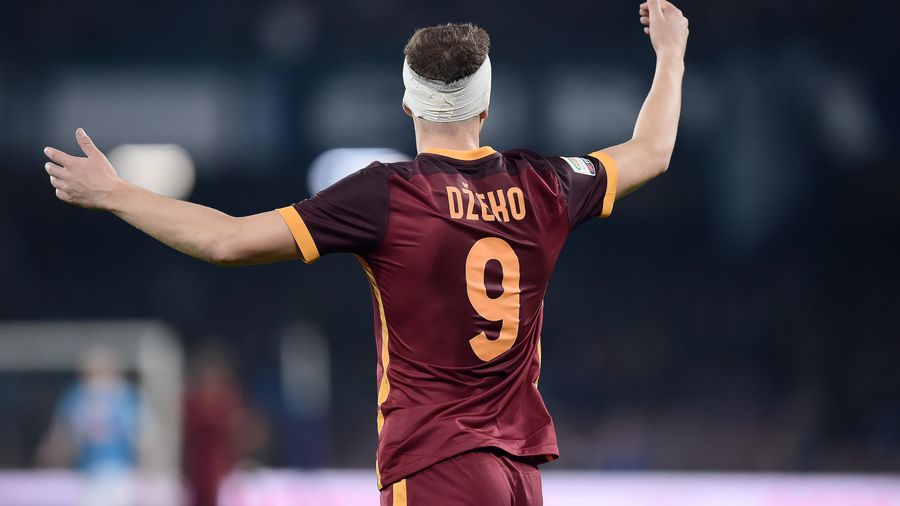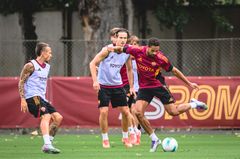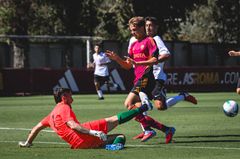

On Sunday he etched his name into club history - moving into the top three on the club's list of all-time leading goalscorers.
Having watched his entire Giallorossi career to date, Roma fan and journalists Samuel Bannister offers his personal reflections on what Edin Dzeko has meant to him...
Supporters of every club can appreciate any player for their talents – but sometimes, one comes along that means just that little bit more.
Someone who embodies their passion for their club, who represents them with pride on the biggest occasions, and makes the fans feel like they are on a journey with them.
For me, as a Roma supporter, that player is Edin Dzeko.
When Dzeko first arrived in Rome back in 2015, the expectations were mixed. It was clear at the time that Roma needed a new striker, but there were a few doubts over whether the former Manchester City forward was of the profile required.
Others, though, recognised the experience and quality that Dzeko would bring. He had scored wherever he had been, winning titles in England and Germany.
This was the type of player who was bound to make an impact.
Fast-forward five years, and that’s definitely what he has done.
Initially, I was torn between the two points of view about Dzeko. He was a striker with a big reputation, without a doubt, but would he fit into the system at Roma?
His first season proved there was a rationale behind those doubts, but everything after then has demonstrated what a high quality striker Edin is. Instead of worrying if he fits into the system, he has become someone the setup has been built around.
The easy thing to say about Dzeko would be that his time at Roma did not get off to the best of starts. But even that wouldn’t be strictly true.
When Dzeko scored four minutes into his Roma debut, in a friendly against Sevilla, the excitement and belief started to kick in that he was going to be a success.
Almost immediately, my own uncertainty had been thrown aside and turned into a conviction that Dzeko was going to be inspirational for Roma.
As we know, it eventually took a little longer for Dzeko to fulfil that initial spark of potential than originally expected.
As his first season at Roma progressed, he was missing more big chances than he was scoring. Sometimes, using Francesco Totti or Diego Perotti as a false nine seemed like a better option.
But if there’s one thing about Dzeko that cannot be questioned, it’s his resilient mentality. Having overcome adversity on and off the football pitch, he has the mind-set of a winner, and knows how to bounce back.
That’s exactly what he did in his second season – and in some style too.
Watching from afar every step of the way, in the 2016-17 campaign it seemed like every time Dzeko took to the pitch, he would score.
More often than not, he did.
The 39 goals across all competitions he scored that season was a club record.
It was about that time when I began to become eager to learn more about Roma’s history. Since childhood, I had felt an affinity to the team in its present guises, but as my passion for the club grew, it became important to me to steep myself in its stories of days gone by.
In many ways, Dzeko has been my key to unlocking and understanding that. Whenever he has broken a record, it has brought his predecessors into greater focus.
Dzeko’s second season in Rome was the first real example of that, as his record-breaking goalscoring campaign saw the stories of legendary former strikers like Rodolfo Volk unearthed.
With his 39 goals, including a Capocannoniere-winning 29 in Serie A, Dzeko had established himself as the forefront of Roma’s attack. It speaks volumes about his consistency that when looking back, I remember his campaign as a whole more than its individual moments.
That year, we came to expect greatness from Dzeko – and he delivered on a regular basis.
But even then, my expectations were still admittedly mixed ahead of his third season. The main questions revolved around whether he would be able to maintain those levels, and how he would react to working under a new coach, as Eusebio Di Francesco replaced Luciano Spalletti.
That summer was the last time I would ever doubt Edin Dzeko.
In football, the difference between a great player and a legend becomes clear via the moments they choose to express themselves in. Times when what they do has a greater significance than its intrinsic value.
Perhaps, for these icons, being there in those moments is not in fact a choice – it’s a duty.
No-one becomes a professional footballer without talent, but the ones who get remembered most are those who step up on the biggest stages. The ones who are there in the right place, at the right time, every time.
In 2017-18, that’s what Dzeko became. He made it his duty to be Roma’s man for the big moments. By the end of that season, in my eyes, he was already a club legend.
Dzeko wrote himself into folklore by playing a pivotal role in Roma’s journey to the Champions League semi-finals (the most extraordinary cup run I have ever witnessed). His unforgettable volley against Chelsea in the group stages, for example, seemed to make time stand still.
Even nearly three years on, having watched the goal an immeasurable number of times, that moment still fascinates me. The technique – on his weaker foot – was exquisite.
For that brief moment, Dzeko seemed to transcend everyone else on the pitch. Nothing could have stopped him that day.
He went further by firing Roma into a shock lead with a well-placed header moments later. The win eventually slipped away as Chelsea equalised, but there was not much disappointment. The buzz from Dzeko’s first goal had almost made everything else smaller in significance.
Indeed, the dropped points were not enough to prevent Roma finishing top of Group C. The knockout stages beckoned – and Dzeko scored in every round.
When Roma needed to come from behind against a Shakhtar Donetsk side managed by, of course, current boss Paulo Fonseca, it was Dzeko who took on the responsibility.
When Roma seemed down and out in the first leg against Barcelona, having fallen three goals down, it was Dzeko who took on the responsibility.
And when Roma needed inspiration to stage the famous comeback we all remember in the second leg, it was Dzeko who took on the responsibility.
The goal that Dzeko scored in the first leg at Camp Nou is actually one of my favourites from his repertoire.
Were it not for the significance of what it led to, it would likely have been forgotten, becoming just a number among his endless tally of goals. But even before the scarcely believable events that I witnessed first-hand at Stadio Olimpico six days later, that goal, for a split-second, gave me a sense of belief I never expected to have.
When everything seemed like a lost cause, Dzeko turned on a switch in my brain that suggested perhaps there was still a chance.
The switch almost turned itself off again when another goal was conceded to increase the deficit to three again. But when Dzeko stabbed Roma in front in the return leg a week later, somehow there was no reason not to believe any more.
For a Roma fan based in the UK, trips to games are regrettably few and far between. However, I was fortunate enough to be at the Olimpico for the comeback against Barcelona – sat directly in line with the position from which Dzeko scored the opening goal. He had set a miracle in motion.
That Champions League run began to show why Dzeko was becoming a legend. It’s all about the moments. He certainly had plenty that year.
In the 2018-19 season, despite his goal tally dropping by 10, my admiration for Dzeko did not diminish. From this point, it never could. Already with nearly 75 goals to his name by the time that season started, he had contributed too much to be written off.
No player should ever be exempt from criticism if they are underperforming, of course. But what Dzeko had achieved on the positive side of things, for me, outweighed anything he did of the opposite standard.
And even so, any negative thoughts about Dzeko, for me, always have to be qualified with context. Whenever he misses a big chance, like every striker does, or his technique slightly falters, my thoughts reflect to the stories of his upbringing.
Raised in the midst of the conflict in the Balkans in the 1990s, Dzeko faced challenges right from his early childhood. Sometimes it wasn’t even safe for him to be outdoors – let alone think about playing football.
As a result, he couldn’t start training properly until the age of 10, when he joined Zeljeznicar’s youth team. By then, he had already missed some fundamental years of his development as a player.
I often wonder, had Dzeko been born in a safer time that would have allowed him to start being coached younger, just how good he could have been. And that’s for a player who I already consider world class.
Hence, even though his fourth season in Rome was a bit of a challenge – though not without its bright moments, of course – the news of him renewing his contract ultimately delighted me.
There had been a genuine fear that Dzeko’s adventure with Roma might have been over that summer. With only one year left on his contract, transfer rumours of a potential exit were relentless.
Admittedly, when he signed his renewal to blow those rumours out of the water, I was a little surprised at first. It was an excited sense of surprise. I felt a similar sense of anticipation to the one I had originally felt all those years ago, when I had found out how quickly he’d scored on his debut against Sevilla.
Hence, the 2019-20 season – Dzeko’s fifth in the capital, and first as club captain – has been something of a celebration.
Witnessing his ascent up the club’s all-time goalscoring charts has been a great journey to follow. If anything, it may have even slightly overshadowed what a good season he has had.
Under a new coach in Fonseca and still going strong at the age of 34, whenever Dzeko scored the attention always turned to who he could catch in the rankings next.
It was to such an extent that the impressive nature of just how regularly was still contributing, when considering the season as a standalone, has perhaps not been appreciated enough in its own right.
He scored as many goals in 2019-20 as when he first won the Premier League with Manchester City eight years ago.
After starting the season level with Abel Balbo on 87 goals for Roma, Dzeko has also surpassed Vincenzo Montella and Pedro Manfredini over the past 12 months, before tying level with Rodolfo Volk in joint-fourth place on 106 goals.
Now he has just matched Amedei Amadeo, the first great Roma striker, for third - scoring 111 goals in exactly the same time (234 games) it took the club's youngest ever player to do it.
As mentioned earlier, watching him overtake such legends – and becoming the club’s all-time leading foreign goalscorer in the process – has put into perspective how good he has been for Roma.
It’s a shame he has not been able to win any trophies along the way, but in many ways, that makes the circumstances in which he has achieved what he has done even more impressive.
However many years Dzeko has left at Roma, I will never forget what he has given to this club – and hopefully, what he will continue to give.
With so many to choose from, it’s hard to zone in on just a few memorable moments. But among those that I hold dearest from Dzeko’s half-a-decade of service to Roma so far are his role in the Champions League run (of course), his hat-trick in the Europa League against Villarreal the year before, his volley against Torino at the start of the 2018-19 season, his brace of the same type of strikes against Sampdoria back in June to ensure a positive return from lockdown, even his close-range header from atop a protective mask against Milan last October…
Yes, moments. There have been more than a fair few for Edin Dzeko.
All those moments have ensured he stands up shoulder to shoulder among the greats from this club’s illustrious history.
That’s why, as my love for Roma has grown, so has my appreciation of the player who wears the No. 9 shirt of those beloved colours.
Like Volk in the 1920s and 30s, Manfredini in the 60s or Roberto Pruzzo in the 80s, Dzeko is the striker that has represented Roma in my generation. And watching virtually his every kick in a Roma shirt has been a joy that I hope can continue as long as possible.
Of course, Francesco Totti will always be my favourite player of all-time. There are some legends who will never be surpassed. But I wasn’t even alive when Totti made his first Roma appearance.
For Dzeko, though, I’ve seen his journey from the start. That has made it special in its own, unique way.
I’d still be a Roma supporter if Dzeko had never been at the club, but he has been the focal point running through my journey to being as passionate as I am today. That means a lot to me.
And I hope to be telling his story for years to come.
You can follow Samuel Bannister on Twitter: @SamBanno1

 Tickets
Tickets
 Shop
Shop
















































